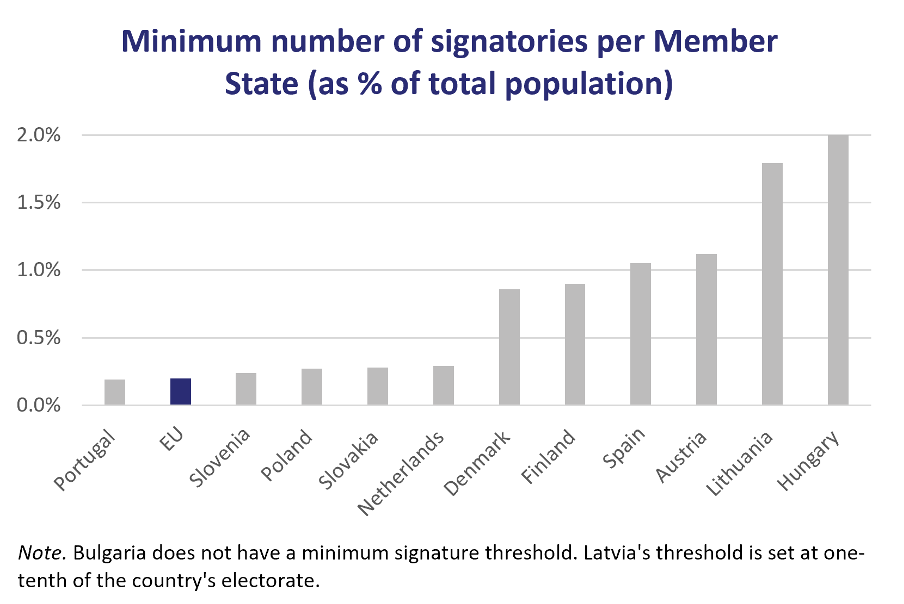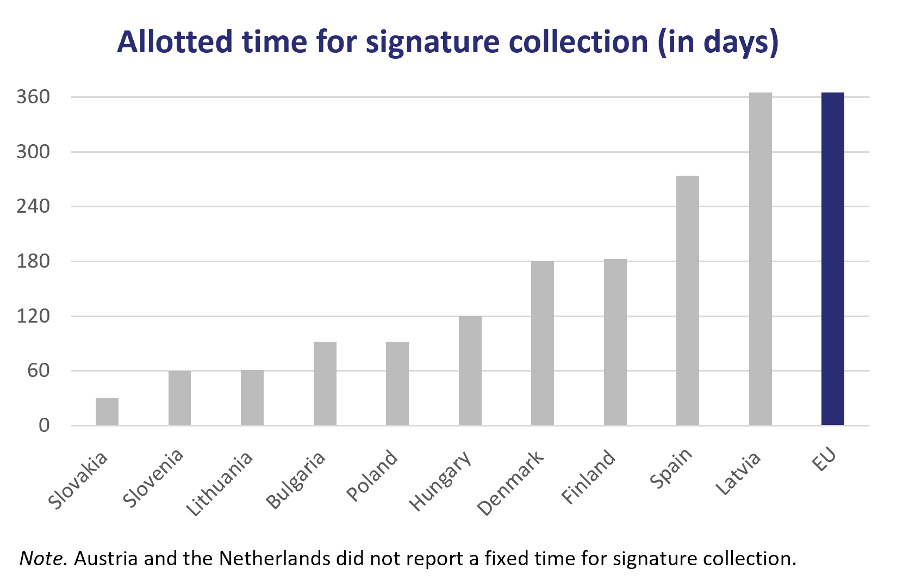
While many Member States of the European Union allow citizen participation in the legislative process through citizens’ initiatives, none provide the level of support for initiative organisers of European citizens’ initiatives offered by the European Commission via the European Citizens’ Initiative Forum. This is one of the main findings of a recent survey among national authorities from fourteen Member States on the regulations and use of their citizens’ initiative instruments.
The national citizens initiatives, in general, require a higher percentage of signatures, and give organisers a shorter time to collect them, compared to the threshold and timeframe for successful signature collection of the European citizens’ initiatives (ECIs).
The consultation, carried out by Democracy International between March and June 2023 aimed to gather best practices in the specifications and processes regarding national agenda setting initiatives or similar types of petitioning instruments that involve signature collection at a national level. Specifically, the consultation aimed to gather rules for organisers on how initiatives must be set up, the support services offered to organisers, the online infrastructure related to the initiative, signature collection thresholds, and if online signature collection is an option, how digital signatures are managed, and the minimum number of signatories for national initiatives across Member States.
Valid responses were received from 13 of the 18 countries with citizen participation tools: Austria, Bulgaria, Denmark, Finland, Hungary, Latvia, Lithuania, the Netherlands, Poland, Portugal, Slovakia, Slovenia, and Spain.
Procedures
All 13 countries operate in a similar way when it comes to the procedure and the specifications of citizens’ instruments. Similarly to the European Citizens’ Initiative, some national authorities require setting-up an organisers’ group. For the ECI, this requirement is a group of 7 EU citizens living in 7 different Member States. For the 13 countries in this study, the requirements differ from country to country.
For example, in Poland, it is required to have a legislative committee of 15 people. In Latvia, there must be a group of 10 citizens eligible to vote. In Finland, the requirement is a group of at least 5 citizens eligible to vote with one representative and one substitute. In Hungary, a referendum is started through the collection of signatures of 20 to 30 people.
In regard to signature collection, the number of signatures and the allotted time to collect those signatures varies slightly across the countries analysed. In the ECI, organisers must collect at least 1 million signatures of support while reaching the minimum threshold in at least seven EU countries. For the European Citizens’ Initiative, the signature thresholds as a percentage of the (general) population is lower than for comparable instruments in most of the countries consulted in this study. For example, Bulgaria is the only country that does not have any threshold for the number of signatures needed to make an initiative valid. Compared to Latvia which requires ten percent of its population eligible to vote. See the specific figures for each country in the graph below.
In terms of the timeframe to collect signatures, the allotted time to collect signatures for the European Citizens’ Initiative is significantly longer in comparison to the comparable national instruments in this report. Organisers of an ECI have 12 months (1 year) to collect at least 1 million signatures. In the Netherlands and Portugal, there is no fixed time limit and in Spain the time limit is nine months. See the specific figures for each country in the graph below.
Online and offline signature collection and signature collection systems
From the start, the ECI offered both online signature collection (through individual collection systems, and now solely through the Central Online Collection System) and offline (paper) signature collection. In comparison, Lithuania, the Netherlands, Denmark, Latvia, Austria, Spain, Slovenia, Finland, and Portugal allow both an online collection and offline (paper) signature collection, while Bulgaria, Poland, and Hungary do not allow or provide the infrastructure for the online collection of signatures. Slovakia, on the other hand, offers only an online collection system with no possibility to collect signatures on paper.
Among the countries with the possibility to collect signatures online, only Spain does not provide an official centralised system. In the Netherlands, Latvia, Portugal, and Finland, an alternative individual system, which must be approved by each country, is also permitted alongside the centralised system. In order to use their own collection system in Finland, organisers need a certificate from the Finish Communications Regulatory Authority.
Concerning the requirements for signing initiatives, they are essentially the same as for the ECI. The signatories must be eligible to vote, they must be at least 18 years old (except for Latvia and Austria, where regarding the petitions the minimal age is 16), they must also provide name, surname, address, and, depending on the country, the personal identification number. For countries working only with paper signatures, a handwritten signature is always required. In the case of Denmark, Finland and Austria, the use of national eID is permitted.
Awareness
Citizen awareness of the existence of the citizen initiatives varies significantly between countries. According to the relevant authorities in Bulgaria, Lithuania, the Netherlands, and Portugal, the tools are not popular and rarely used. Similarly, Slovakia reported the instrument as “underused”. Only 5 countries: Latvia, Austria, Slovenia, Finland and Denmark, reported some level of success and a relatively high level of use. In Slovenia, the use of the tool has especially risen since the COVID-19 pandemic. In 2022 there were 13 registered initiatives, and by mid-2023 12 new initiatives have already been registered. In Latvia, since 2013, when the instrument was launched, 46 initiatives have been submitted. In Denmark, in the five years of the instrument’s existence, 1500 proposals have been published on the dedicated website. Similarly, the awareness of the European citizens’ initiative has also been increasing over the past 11 years. Since 2012, 103 European citizens’ initiatives were registered. Awareness of these participatory democracy tools directly links to their success. As more citizens are informed about these tools, more citizens will launch and sign initiatives.
A lack of knowledge about the respective national instruments was often linked to a lack of communication activities. Lithuania was the only country, in this study, in which the citizen initiative tool was publicised in national media. However, for most, only governmental websites report about the initiatives or give awareness to them: the House of Representatives in the Netherlands, the Parliament's website in Denmark, and the National Election Office in Hungary. In Finland, a broad umbrella of governmental websites promotes the tool, one of them, Demokratia.fi is a website used to communicate democracy services at the local, national, and European levels. In the case of Spain, the national authorities interviewed, indicated not providing or raising awareness on the tool. Thus, the ‘underuse’ of the instruments, in these countries, can be a result of the lack of communication around the instrument.
Support for organisers
Regarding support for organisers, there is no Member State that provides support to organisers of national citizens initiative that is comparable to the support offered by the European Commission via the ECI Forum. In the Netherlands, Poland, Finland and Latvia, information about the national citizens initiative can be found or requested on their respective governmental platform. However, there is no direct help centre, similar to the ECI Forum, established in any of the countries surveyed for this study. Bulgaria is the only country that reported that assistance to organisers is provided by NGOs or external actors.
In terms of funding, most of the countries do not provide funding schemes for organisers. Funding for initiatives mostly comes from external sources such as donations. In some cases, donations have to be reported. For example in Finland, donations exceeding 1500 EUR per donor have to be reported. This is similar to the ECI, where sources of support or funding exceeding 500 EUR must be reported.
There are only two countries in this study who differ from the others in regard to funding schemes available to organisers: Spain and Austria. Austria is a peculiar case, requiring organisers to pay a contribution for their initiative to be registered (622 EUR for registration and 2799.50 EUR after approval of the request). If the initiative is successful (reaches the signature collection threshold, etc.) the cost is reimbused fivefold, which is approximately 17 000 EUR. Similarly, Spain also provides funding in the case of a successful initiative, i.e. when the initiative reaches the Parliament, which can go up to 341 000EUR. Overall, the threshold to obtain funding from Member States’ that offer it is quite high.
- Categories
The opinions expressed on the ECI Forum reflect solely the point of view of their authors and can in no way be taken to reflect the position of the European Commission or of the European Union.



Leave a comment
Comments